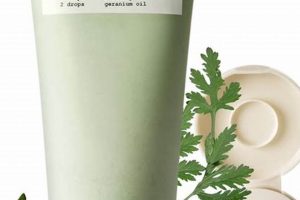The question of whether a substance is acceptable within a vegan lifestyle often hinges on its source. Glycerin, also known as glycerol, is a trihydroxy sugar alcohol. Its origins can be either animal-derived or plant-derived, making its suitability for vegans dependent on its specific production method. For instance, glycerin produced as a byproduct of soap making using animal fats is not vegan, whereas glycerin derived from vegetable oils like soy or palm is.
Understanding the derivation of ingredients is crucial for individuals adhering to a vegan diet. Ethical concerns around animal exploitation and environmental impact necessitate careful examination of product composition. Historically, glycerin was frequently sourced from animal fats. However, increased demand and advancements in chemical processes have led to a greater availability of plant-based alternatives. This shift reflects a broader trend toward more sustainable and ethically sound sourcing practices within the food and cosmetic industries.
Therefore, to determine if a product containing glycerin aligns with vegan principles, it is essential to investigate the source. Consumers should look for certifications, ingredient lists clearly indicating vegetable-derived glycerin, or contact the manufacturer directly for clarification. The following sections will delve deeper into identifying vegan-friendly glycerin and exploring its common applications.
Guidance on Determining the Vegan Status of Glycerin
Navigating the complexities of ingredient sourcing is essential for those adhering to a vegan lifestyle. The following tips provide guidance on assessing whether glycerin aligns with vegan principles.
Tip 1: Examine the Ingredient List: Scrutinize product labels for specific indications of the source. Terms such as “vegetable glycerin” or “plant-derived glycerin” suggest a vegan-friendly origin.
Tip 2: Seek Vegan Certifications: Look for certifications from reputable organizations like Vegan Action or The Vegan Society. These certifications ensure that the product meets stringent vegan standards, including glycerin sourcing.
Tip 3: Contact the Manufacturer: If the ingredient list is ambiguous, contact the manufacturer directly. Inquire about the source of the glycerin used in their products and request documentation if available.
Tip 4: Research the Brand’s Ethics: Investigate the brand’s overall ethical stance. Companies committed to vegan and cruelty-free practices are more likely to use vegetable-derived glycerin.
Tip 5: Be Wary of Generic Terms: Exercise caution when encountering the term “glycerin” without further clarification. This unspecified term does not guarantee a plant-based origin.
Tip 6: Consider the Product Type: Recognize that certain product categories, like conventional soaps, may traditionally utilize animal fats in their production. Extra vigilance is required when assessing these items.
Tip 7: Look for Palm Oil Statements: If the glycerin is derived from palm oil, assess the brand’s commitment to sustainable palm oil sourcing. While palm oil can be vegan, its environmental impact is a significant consideration.
Adhering to these guidelines empowers informed consumer choices and promotes the consumption of glycerin derived from ethical and sustainable sources.
The subsequent sections will explore the varied applications of glycerin and its role in both vegan and non-vegan product formulations.
1. Source identification
The vegan status of glycerin is directly contingent upon accurate source identification. The origin of the substance dictates whether it aligns with vegan principles. Glycerin derived from animal fats renders a product non-vegan, whereas plant-derived glycerin aligns with vegan dietary and ethical standards. Without verifiable identification of the glycerin’s source, consumers cannot definitively determine if a product is vegan-compliant. For example, the ambiguity in ingredient lists lacking the specification “vegetable glycerin” necessitates further investigation by contacting manufacturers or scrutinizing certifications.
Effective source identification requires diligence in examining product labels and seeking corroborating information. Third-party certifications from recognized vegan organizations offer an additional layer of assurance. Consider the case of cosmetics: a lotion marketed as natural may contain glycerin. However, the absence of “vegetable glycerin” on the label necessitates further inquiry to confirm its vegan status. Companies committed to transparency will often disclose the origin of their glycerin, thereby facilitating informed consumer choices.
In conclusion, source identification is a non-negotiable prerequisite in determining if glycerin is vegan. The lack of transparency and clear labeling practices present challenges for consumers. However, actively seeking certifications, contacting manufacturers, and prioritizing brands committed to ethical sourcing empowers individuals to make informed decisions aligned with their vegan values.
2. Plant-based alternatives
The determination of whether glycerin aligns with vegan principles is fundamentally linked to the availability and utilization of plant-based alternatives. If all glycerin originated exclusively from animal sources, the question of its vegan suitability would be definitively answered in the negative. However, the existence of plant-based glycerin derived from vegetable oils introduces the possibility of vegan-compatible products. The rise of plant-based alternatives directly impacts the feasibility of formulating vegan versions of items commonly containing glycerin, such as soaps, lotions, and processed foods.
The increasing demand for vegan products has driven innovation in the sourcing and production of plant-based glycerin. Vegetable oils, including soy, coconut, and palm, serve as primary raw materials for its creation. This shift has broadened the scope of vegan products and offered consumers alternatives to items traditionally reliant on animal-derived glycerin. For instance, a company producing vegan skincare products can utilize glycerin derived from coconut oil, clearly labeled as such, to ensure compatibility with vegan dietary and ethical guidelines. Without these plant-based options, formulating truly vegan alternatives would be significantly constrained.
In conclusion, plant-based alternatives are a critical component in addressing the question of whether glycerin is vegan. Their availability directly enables the production of vegan-compliant products across various industries. However, it remains imperative for consumers to verify the source of glycerin through ingredient lists, certifications, or direct communication with manufacturers to guarantee adherence to vegan principles. The development and adoption of sustainable, plant-based glycerin sources are essential for fostering a more inclusive and ethical marketplace.
3. Animal fat origins
The question of whether glycerin is vegan is directly and negatively influenced by animal fat origins. Glycerin derived from animal fats renders a product unsuitable for individuals adhering to a vegan lifestyle. This incompatibility stems from the core vegan principle of abstaining from any product involving animal exploitation or harm. The historical prevalence of animal fat as a primary source for glycerin production necessitates careful scrutiny to ensure ethical consumption. For example, traditional soap-making often utilized tallow, rendered animal fat, as a key ingredient, resulting in glycerin as a byproduct. Consequently, any product relying on glycerin sourced from this process is inherently non-vegan.
The importance of understanding animal fat origins lies in its direct impact on product integrity and consumer choice. The ambiguity of the term “glycerin” on ingredient lists necessitates further investigation to ascertain its source. Vegan consumers must actively seek certifications or contact manufacturers to verify the absence of animal-derived components. Consider the example of processed foods: While some may contain vegetable-derived glycerin as a humectant, others may utilize glycerin from unspecified sources, potentially derived from animal fat. Without diligent assessment, consumers risk unknowingly consuming non-vegan products, undermining their ethical commitments.
In summary, the origin of glycerin from animal fat constitutes a fundamental barrier to its vegan compatibility. Recognizing this connection is crucial for informed consumer decisions and maintaining adherence to vegan principles. The challenges posed by unclear labeling practices underscore the need for greater transparency and certification to facilitate ethical consumption. Moving forward, increased reliance on plant-based glycerin sources and clear communication regarding product composition are essential for ensuring that glycerin-containing products align with the values of the vegan community.
4. Certification importance
The importance of certification in determining the vegan status of glycerin cannot be overstated. Given that glycerin can be derived from both animal and plant sources, reliance on unverified ingredient lists alone is insufficient for ensuring adherence to vegan principles. Certification from reputable organizations offers an independent validation of the product’s composition and manufacturing processes.
- Assurance of Source
Vegan certifications provide assurance regarding the origin of glycerin. Certifying bodies conduct audits to verify that the glycerin used in a product is indeed derived from plant-based sources, such as vegetable oils, and not from animal fats. This eliminates ambiguity and reduces reliance on potentially misleading or incomplete ingredient labels.
- Verification of Processes
Certifications extend beyond simply identifying the source of glycerin. They also verify that the manufacturing processes employed do not involve the use of animal products or byproducts. This holistic assessment ensures that the entire production chain aligns with vegan standards, minimizing the risk of cross-contamination or unintended use of animal-derived substances.
- Consumer Trust and Transparency
Vegan certifications foster consumer trust and promote transparency in the marketplace. By displaying a recognized vegan certification symbol, manufacturers provide clear and easily identifiable information to consumers seeking vegan-compliant products. This reduces the burden on consumers to conduct extensive research and allows them to make informed purchasing decisions with confidence.
- Standardization and Accountability
Certifying organizations establish clear standards and guidelines for vegan product manufacturing. These standards provide a benchmark for companies seeking certification and create a framework for accountability. Regular audits and ongoing monitoring ensure that certified products continue to meet the required criteria, maintaining the integrity of the certification and the vegan status of the glycerin within.
In conclusion, the role of certification is paramount in navigating the complexities of glycerin’s vegan status. By providing independent verification, process validation, and consumer assurance, certifications offer a reliable mechanism for ensuring that glycerin-containing products align with vegan ethical standards. The presence of a credible vegan certification symbol significantly strengthens the determination that “glycerin is vegan” within the context of a specific product.
5. Sustainable sourcing
The correlation between sourcing practices and the question of “is glycerin vegan” is significant. While glycerin can be vegan if derived from plant-based sources, the sustainability of those sources introduces a layer of complexity. Ethical consumption requires not only ensuring that glycerin is free from animal products but also that its production does not contribute to environmental degradation or social injustice.
- Palm Oil Production and Deforestation
A common source of plant-based glycerin is palm oil. However, unsustainable palm oil production is a major driver of deforestation, particularly in Southeast Asia. This deforestation leads to habitat loss for endangered species and contributes to climate change. Consequently, even if glycerin is technically vegan because it’s derived from palm oil, its use may still conflict with broader ethical considerations regarding environmental sustainability. A company using palm oil-derived glycerin should demonstrate commitment to certified sustainable palm oil (CSPO) to mitigate these concerns.
- Alternative Vegetable Oil Sources
To address the sustainability concerns associated with palm oil, alternative vegetable oil sources for glycerin production are gaining prominence. Soy, coconut, and rapeseed oils can provide viable and more sustainable alternatives, depending on their production methods. For instance, soy cultivation can also lead to deforestation if not managed responsibly. Therefore, thorough assessment of the environmental impact of each source is essential. A company might choose coconut oil from sustainably managed plantations as a more ethical option.
- Traceability and Supply Chain Transparency
Sustainable sourcing necessitates robust traceability and transparency throughout the supply chain. Consumers need to be able to verify the origin of the glycerin and ensure that it adheres to ethical and environmental standards. This requires manufacturers to provide detailed information about their suppliers and production processes. Blockchain technology can be used to track the glycerin from its origin to the final product, ensuring accountability and preventing fraudulent claims of sustainability.
- Impact on Local Communities
The production of vegetable oils for glycerin extraction can have significant impacts on local communities in producing regions. Sustainable sourcing should prioritize fair labor practices, protect the rights of indigenous peoples, and contribute to local economic development. A company sourcing soy-derived glycerin from South America should ensure that its operations do not displace local communities or contribute to land grabbing.
In summary, while glycerin can be vegan, the determination of its ethical suitability extends beyond merely verifying its plant-based origin. Sustainable sourcing requires a holistic assessment of environmental and social impacts, including deforestation, biodiversity loss, labor practices, and community well-being. Companies committed to ethical production must prioritize transparency, traceability, and responsible sourcing practices to ensure that their use of glycerin aligns with broader sustainability goals. This nuanced approach is essential for consumers seeking to make informed choices that support both animal welfare and environmental protection.
Frequently Asked Questions
This section addresses common inquiries regarding the vegan status of glycerin. It aims to provide clear, factual information to assist consumers in making informed decisions.
Question 1: What exactly is glycerin?
Glycerin, also known as glycerol, is a trihydroxy sugar alcohol. It is a viscous, odorless, and colorless liquid commonly used in cosmetics, pharmaceuticals, and food products as a humectant, solvent, and emollient.
Question 2: Can glycerin be derived from animal sources?
Yes. Glycerin can be a byproduct of animal fat processing, particularly in soap manufacturing where fats are saponified. Glycerin derived from this process is not vegan.
Question 3: Are there plant-based alternatives to animal-derived glycerin?
Absolutely. Plant-based glycerin is commonly derived from vegetable oils such as soy, coconut, and palm. This type of glycerin is considered vegan.
Question 4: How can a consumer determine if glycerin in a product is vegan?
The most reliable method is to look for certifications from recognized vegan organizations (e.g., Vegan Action, The Vegan Society). Additionally, ingredient lists may specify “vegetable glycerin.” If the source is unclear, contacting the manufacturer is recommended.
Question 5: Is glycerin derived from palm oil vegan?
Glycerin from palm oil is technically vegan. However, ethical considerations surrounding unsustainable palm oil production (deforestation, habitat loss) necessitate careful evaluation. Look for products using certified sustainable palm oil (CSPO).
Question 6: Does the term “glycerin” on an ingredient list automatically indicate a non-vegan product?
No. The presence of “glycerin” alone does not automatically signify a non-vegan product. It is crucial to investigate the specific source of the glycerin, as it could be either animal-derived or plant-derived. Further clarification is often required.
In summary, the vegan status of glycerin is contingent upon its source. Consumers must be diligent in verifying the origin of the glycerin through certifications, ingredient lists, or direct communication with manufacturers.
The following section offers a conclusion on whether glycerin is vegan and other topics related to it.
Conclusion
The examination of “is glycerin vegan” reveals a nuanced situation. The inherent nature of glycerin does not preclude its inclusion in a vegan lifestyle. However, its compatibility hinges entirely on its source. Glycerin derived from animal fats contravenes vegan principles, while plant-derived glycerin, sourced from vegetable oils, aligns with such ethical considerations. The absence of explicit source identification on product labels necessitates diligent investigation by consumers.
Ultimately, the responsibility rests with both manufacturers and consumers. Clear labeling practices, coupled with readily available information regarding sourcing, are paramount. Consumers must actively seek certifications, scrutinize ingredient lists, and engage with manufacturers to ensure that their purchases align with their values. The increasing demand for transparency and ethical sourcing practices signals a potential shift towards greater accountability within the industry, fostering a future where informed choices are more readily accessible. The pursuit of ethically sound consumerism is a continuous endeavor.







